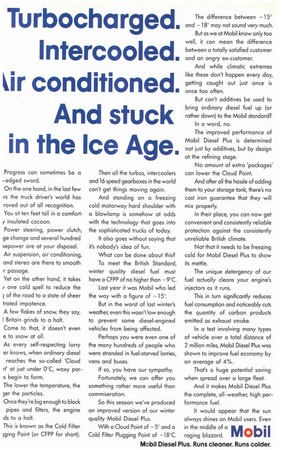Turbocharged.
Page 23

If you've noticed an error in this article please click here to report it so we can fix it.
Intercooled ir conditioned.
And stuck in the Ice Age.
Progress can sometimes be a ,-edged sword.
On the one hand, in the last few irs the truck driver's world has roved out of all recognition. You sit ten feet tall in a comforty insulated cocoon.
Power steering, power clutch, ge change and several hundred sepower are at your disposal. Air suspension, air conditioning, and stereo are there to smooth r passage.
Yet on the other hand, it takes one cold spell to reduce the 3 of the road to a state of sheer trated impotence.
A few flakes of snow, they say, I Britain grinds to a halt.
Come to that, it doesn't even e to snow at all.
As every self-respecting lorry er knows, when ordinary diesel reaches the so-called 'Cloud it' at just under 0°C, waxy par begin to form.
The lower the temperature, the 3er the particles.
Once they're big enough to block pipes and filters, the engine Ids to a halt.
This is known as the Cold Filter 3ging Point (or CFPP for short). Then all the turbos, intercoolers and 16 speed gearboxes in the world can't get things moving again.
And standing on a freezing cold motorway hard shoulder with a blowlamp is somehow at odds with the technology that goes into the sophisticated trucks of today.
It also goes without saying that • it's nobody's idea of fun.
What can be done about this?
To meet the British Standard, winter quality diesel fuel must have a CFPP of no higher than —9°C.
Last year it was Mobil who led the way with a figure of —15°.
But in the worst of last winter's weather, even this wasn't low enough to prevent some diesel-engined vehicles from being affected.
Perhaps you were even one of the many hundreds of people who were stranded in fuel-starved lorries, vans and buses.
If so, you have our sympathy.
Fortunately, we can offer you something rather more useful than commiseration.
So this season we've produced an improved version of our winter quality Mobil Diesel Plus.
With a Cloud Point of —5° and a Cold Filter Plugging Point of —18°C. The difference between —15° and —18° may not sound very much.
But as we at Mobil know only too well, it can mean the difference between a totally satisfied customer and an angry ex-customer.
And while climatic extremes like these don't happen every day, getting caught out just once is once too often.
But can't additives be used to bring ordinary diesel fuel up (or rather down) to the Mobil standard?
In a word, no.
The improved performance of Mobil Diesel Plus is determined not just by additives, but by design at the refining stage.
No amount of extra 'packages' can lower the Cloud Point.
And after all the hassle of adding them to your storage tank, there's no cast iron guarantee that they will mix properly.
In their place, you can now get convenient and consistently reliable protection against the consistently unreliable British climate.
Not that it needs to be freezing cold for Mobil Diesel Plus to show its mettle.
The unique detergency of our fuel actually cleans your engine's injectors as it runs.
This in turn significantly reduces fuel consumption and noticeably cuts the quantity of carbon products emitted as exhaust smoke.
In a test involving many types of vehicle over a total distance of 2 million miles, Mobil Diesel Plus was shown to improve fuel economy by an average of 4%.
That's a huge potential saving when spread over a large fleet.
And it makes Mobil Diesel Plus the complete, all-weather, high performance fuel.
It would appear that the sun always shines on Mobil users. Even in the middle of a mobil raging blizzard.




















































































































